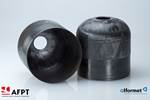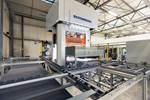Thermoplastic tape friction tester completed at TPRC
Delivered and implemented at Toray Advanced Composites, the setup seeks to eliminate defects during hot press forming thermoplastic tapes.
Source | TPRC
The ThermoPlastic composites Research Center (TPRC, Enschede, Netherlands) has recently highlighted the completion and delivery of a novel friction tester for thermoplastic matrix composite tape in melt to Toray Advanced Composites (Nijverdal, The Netherlands). The completed setup provides a better understanding of the friction behavior of thermoplastic composites in melt, to avoid the occurrence of defects during hot press forming of the material.
The development of the friction tester was achieved by TPRC doctoral student Rens Pierik and University of Twente researcher Sam Benou as part of the press forming without defects (PERFECT) project. The test setup measures the resistance against sliding of adjacent plies to simulate what happens during press forming of thermoplastic composites.
Earlier research, as part of the PERFECT project, revealed insights into the , to be used as a basis for future constitutive modeling. More about this work can be .
The Dutch Research Council (NWO) supports this research project.
For related content, also read:
- TPRC research project investigates thermoplastic composite structure repair strategies
- TPRC research studies void removal mechanisms in VBO processing
Related Content
-
Combining multifunctional thermoplastic composites, additive manufacturing for next-gen airframe structures
The DOMMINIO project combines AFP with 3D printed gyroid cores, embedded SHM sensors and smart materials for induction-driven disassembly of parts at end of life.
-
Bladder-assisted compression molding derivative produces complex, autoclave-quality automotive parts
HP Composites’ AirPower technology enables high-rate CFRP roof production with 50% energy savings for the Maserati MC20.
-
Reinforcing hollow, 3D printed parts with continuous fiber composites
Spanish startup Reinforce3D’s continuous fiber injection process (CFIP) involves injection of fibers and liquid resin into hollow parts made from any material. Potential applications include sporting goods, aerospace and automotive components, and more.






